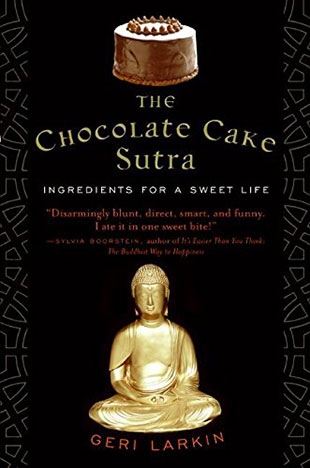Geri Larkin gave up a successful career as a management consultant to become a dharma teacher and start Still Point Zen Buddhist Temple in Detroit, Michigan. She begins her seventh book with a summary of what she has learned: "After all the years of work, the by-now hundreds of thousands of prostrations, years of meditation, and so much chanting that chants fill my head even in the dentist's chair, where I used to pray for death, I've realized this: that everything and everyone is precious beyond words. Everything and everyone is holy. And the point of our being on this sweet planet is to be of service to all of it. And when we understand this truth in our bones, joy fills our hearts. I swear it."
Larkin turns to the Flower Ornament Sutra, which she calls a massive compilation of good advice, for eight practices that can serve as ingredients for a sweet life. If people followed these behaviors, she says, the end result would be spiritual warriors moving out across the land "able to take the slings and arrows of planet life in stride with grace and a grin."
The first ingredient is joy, a quality that naturally lends radiance to our existence and to the lives of those close to us. The Buddha taught that one way to jump start this quality is to be generous. Tolerance is another ingredient in the sweet life. It grows out of a realization that we all share the same yearnings and struggles to make sense of our days. Instead of judging others, we would be wise to acknowledge that they, like us, face uphill climbs and can use a helping hand.
Larkin takes her hat off to clear-headedness and the capacity to keep going with gusto, two more ingredients. She challenges us to become adventurers by taking on whatever feeds us in the deepest possible way. She also celebrates "Yoda's wisdom" — doing our best without being attached to solutions.
In a previous book, Tap Dancing in Zen, Larkin called those people we can turn to for assistance and inspiration when the going gets rough our "spiritual bodyguards." Here she gives thanks for some who have played that role for her: Dr. Martin Luther King, Jr., Therese of Lisieux, various Zen teachers, and a handful of zealous souls at her center in the slums of Detroit.
We were intrigued to read about the author's little excursions to Amish country in order to renew and refresh her soul with "good energy and faith in possibilities." Near the end of this book, Larkin moves to Seattle and makes a vow to live a simpler and ecologically sound life. Not a bad use of the good energy she picked up from the Amish.
